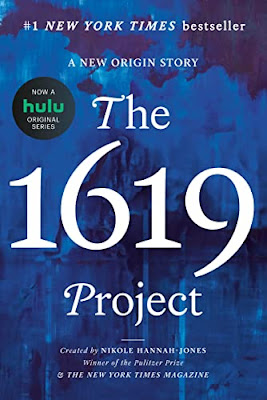From The 1619 Project, by Nikole Hannah-Jones:


|
Why hadn’t any teacher or textbook, in telling the story of Jamestown, taught us the story of 1619? No history can ever be complete, of course. Millions of moments, thousands of dates weave the tapestry of a country’s past. But I knew immediately, viscerally, that this was not an innocuous omission. The year white Virginians first purchased enslaved Africans, the start of American slavery, an institution so influential and corrosive that it both helped create the nation and nearly led to its demise, is indisputably a foundational historical date. And yet I’d never heard of it before."
Book Review: The 1619 Project: American history as it's rarely told, with the true story of what's been done by and to Blacks. With separate authors on chapters on democracy, capitalism, politics, citizenship, religion, music, healthcare, and more, its power builds relentlessly to a call for action at the end.
After the jump, my full review.
Grade: A+
Eighteen chapters by eighteen different authors, interspersed with poems and short fiction, all reframing the history of America by telling the consequences of slavery in America that reach down to the present day. It's not free of controversy, but mostly, it's objective history with some personal perspectives and opinion. The final chapter is a cry of advocacy. All told, it is a major contribution both to American history and the state of America today. As Nikole Hannah-Jones says she's been told, "the 1619 Project, for many people, finally made America make sense."
It's sometimes argued that slavery, at the time of our nation's founding, was a widely accepted practice in the world for centuries, and non-controversial. Arguments by the Founders over how to count enslaved persons when allocating representation in Congress are sometimes interpreted as merely political arguments, not soul-defining moral arguments about slavery itself. The 1619 Project makes it clear that slavery was perceived as a moral wrong by many, including some Founders, from the earliest days of the Republic. If there was one issue that might have prevented the nascent United States of America from coming together in the first place, or breaking apart many times in its first eighty years, it was slavery. It's always been considered a moral evil, even by some slaveholders themselves, except when their economic interests caused them to turn a blind eye to its evil nature.
American self-interest in preserving the institution of slavery led to all sorts of legal, scientific, and moral justifications that still affect us today. To justify enslaving people, Americans found it convenient to believe that Black people were not merely enslaved persons but an inferior race. Laws may be different today, but beliefs are harder to reform. This "is the root of the endemic racism we cannot purge from this nation to this day."
What sparked the American Revolution? American children all learn about the Stamp Act and the Boston Tea Party and the battles of Lexington and Concord. But how many Americans ever learn about the Dunmore Proclamation? In April 1775, Virginia's royal governor, as a war tactic, offered freedom to any enslaved person who fled his enslaver and joined a British "Ethiopian Regiment." For the South, this was the act that infuriated white Virginians and sealed their support for the war for independence.
I've known for a long time that the roots of America's electoral injustices today trace back to the Constitution's omission of a right to vote. Mixed up in that was the Constitution's silence on even so fundamental a question as who is an American. Before the Civil War, even free Blacks were often denied citizenship rights. After the Civil War, when the 13th Amendment put an end to slavery and made Blacks citizens, that lack of an explicit right to vote still afforded opportunity for racism to affect our democracy down to the bitter arguments over voting even today.
"The 1619 Project" contains chapters on how American capitalism, crime and punishment, religion, inheritance and other subjects were all impacted by racism from our earliest days. It also contains chapters on less political topics, like medicine and healthcare, music, even traffic and land use patterns, and how systemic racism influenced these fields as well.
Nikole Hannah-Jones closes this book with a chapter on "Justice" in which she makes a compelling, reasoned argument for reparations. "The 1619 Project" details all the ways that a racial wealth gap exists due to the cumulative affects of racism on generations of Blacks. It argues that there's no solution other than a direct payment policy that would have a major and direct affect on that injustice. Whether you read the first seventeen chapters as convincingly laying the groundwork for that last chapter advocating for reparations, or whether you just have your eyes opened on a side of American history that has for too long been buried, "The 1619 Project" is a necessary correction to Americans' view of our history.

No comments:
Post a Comment